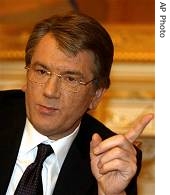2007年VOA标准英语-Ukrainians Disillusioned With Orange Revolution
搜索关注在线英语听力室公众号:tingroom,领取免费英语资料大礼包。
(单词翻译)
By Andre de NesneraWashington
19 April 2007
The ongoing1 political stalemate in Ukraine is a far cry from the heady days of the so-called "Orange Revolution" in 2004. In this report from Washington, Senior Correspondent André de Nesnera looks at the current state of Ukrainian politics.
 |
| Viktor Yushchenko, 10 Apr 2007 |
There was great euphoria in Ukraine then and confidence that the "Orange Revolution" would usher3 in a new era.
But Robert Legvold, a Ukraine and Russia expert at Columbia University in New York, says the euphoria quickly dissipated.
"And it dissipated because the 'Orange Revolution' coalition4 couldn't hang together, was not effective," said Robert Legvold. "Yushchenko has not been a decisive and well-organized president. He's made one mistake after another. As a result of the compromises they'd reached in order to arrive at some kind of peaceful settlement of the fall events in 2004, they created a very weak presidency5, a strong parliament which almost guaranteed gridlock because that had been, to an extent, the nature of Ukrainian politics even beforehand. And in that context of political gridlock, Yushchenko has shown himself to be evermore ineffective."
 |
| Viktor Yanukovych, 02 Apr 2007 |
David Marples, a Ukraine expert at the University of Alberta (in Canada), says Yanukovych's political comeback was remarkable8.
"But there, one has to consider again Yushchenko's actions on taking the presidency," said David Marples. "It was always one of compromise with past foes9 which is very commendable10, but in political life is often a passport to political suicide, because he gave Yanukovich the opportunity to come back and he made compromises at every point. Yanukovich should be dead and buried, and it was up to Yushchenko to do that, and he failed to do it quite markedly."
Experts say another reason why Ukrainians have become disillusioned11 with President Yushchenko is that his administration has been tainted12 by allegations of corruption13.
Margarita Balmaceda, a Ukraine expert at Seton Hall University (in New Jersey), says a glaring example is the agreement reached between Kyiv and Moscow early last year regarding Russian gas supplies.
"As more and more details of this agreement and all the corruption behind it started to come out into the press - because the press is quite free now - people really realized that you do not have a radically14 different political game now as you had before the 'Orange Revolution' [people realized there was no change in the political system]," noted15 Margarita Balmaceda. "And people see, once again, that politics are being conducted without them, that they are not sitting at the table, and people are disillusioned, and people do not feel part of this political process."
About a year ago, the Gallup Organization asked Ukrainians their views about the country's political leadership. The results indicated that only 26 percent of those questioned approved of their political leaders.
The Gallup Organization is expected to update its findings in the next few months. Analysts say it will be interesting to see whether the approval ratings are even lower.
 收听单词发音
收听单词发音 




